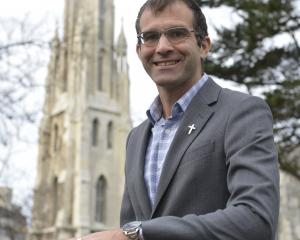The arrival of a new year is a good time to take a fresh look at the virtues and benefits of forgiveness, suggests Ian Harris.
The turn of the year is traditionally a time to take stock of our lives as we look back over where we have been, forward to what we might become, and make our New Year resolutions accordingly.
That could be done at any time, but the holiday season seems to provide enough respite from work pressures to take a step back and reflect.
All faiths encourage taking time to do that, in the hope it will lead to positive changes in attitudes and behaviour.
And a key component in changing ourselves (and therefore the world) for the better is forgiveness.
Forgiveness has three aspects, each of them important: forgiving ourselves for things we have done and now regret, forgiving others for wrongs they have done to us and, most significantly, cultivating a forgiving disposition as part of our own outlook on the world around us.
That poses a timely challenge to those "sensible sentencers" whose sole response to crime is to clamour for punishment and revenge.
The positive impact of forgiveness is highlighted in a series of studies by the John Templeton Foundation, a United States organisation which promotes scholarly inquiry into the moral and spiritual dimensions of life.
Its Campaign for Forgiveness Research has committed $US7 million ($NZ9.4 million) to 46 projects designed to find out just how forgiveness works in individuals, in families and among nations.
This includes measuring its effects on people who choose to forgive, compared with those who nurse grudges and are bent on revenge.
One campaign organiser summed up why she thinks forgiveness matters: "To forgive is to set yourself free, to acknowledge that it does no good to hate.
Hate really, really destroys both the other person and yourself."
American psychology professor Lewis Smedes adds: "As long as our minds are captive to the memory of having been wronged, they are not free to wish for reconciliation with the one who wronged us."
Not that it is easy.
It seems only right that those who have deliberately hurt another in the family, at work, at school or wherever should own up before forgiveness can even enter the frame.
Reasonable as that sounds, unresolved anger carries a cost that may take a greater toll on the victim's mental and physical health than on the offender.
So some Templeton studies focus on the part forgiveness plays in marriages that last, some on parent-child relationships.
Other projects research the effects of forgiveness on stress, health, coping with major illness, and having a disability or Aids.
Others again study reconciling initiatives in strife-torn countries such as South Africa, Rwanda and Northern Ireland.
The centrality of forgiveness to healing and reconciliation is one of the core insights of religions during the past 5000 years.
They have not succeeded in overcoming the vengeful "an eye for an eye" - perhaps Templeton's concerted scientific study will help.
However, it should be obvious to everyone that revenge and forgiveness are poles apart.
Revenge grows out of a sense of injury, while forgiveness flows from love.
For one of the lead researchers, Virginia Commonwealth University psychologist Everett Worthington, this is not theoretical pie in the sky.
While he was writing a book on forgiveness in 1996, an assailant sexually abused his 76-year-old mother, then murdered her with a crowbar.
Worthington's initial response was for vengeance - he wanted to bash the attacker's brains out with a baseball bat.
What price forgiveness now? Then, during a sleepless night of rage and revulsion, he remembered the book he was writing, To Forgive is Human.
He recalls: "I saw myself looking at that baseball bat.
I thought to myself, `Whose heart is darker, mine or his? Who did I write the book for? Everybody else?' That was the moment I forgave him. It changed my whole life."
Forgiving in that way is not weak - it demands courage and commitment.
It does not condone the evil, trivialise the wrong, shorten the grief, or wipe away the desire for justice.
There will still be consequences to work through.
Positively, though, forgiveness lifts the wrong out of the zone of hurt into the zone of healing.
It helps stop bitterness and vengeance from festering.
It restores the initiative to the person wronged and, says Worthington, "it will change the product you come out with at the end of your grief".
To people of faith, forgiveness is a sign of Godness working in and through our humanity.
Even without faith, it is a virtue worth cultivating through 2010.
Ian Harris is a journalist and commentator.












